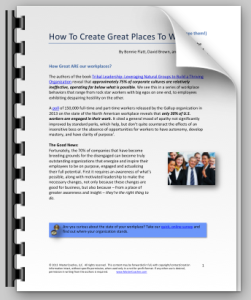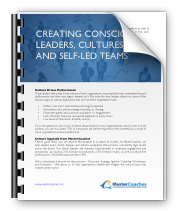The Three Reasons Good People and Companies Suffer, Despite Their Best Efforts:
In our many, ongoing interactions with people, we often come across folks who feel stuck or trapped in their current circumstances. They feel stressed, anxious, and tense about the situation they’re in, which often unfolds with drama. This has serious implications in both the individual’s and the organization’s overall effectiveness and well-being.
Let’s be honest: who among us hasn’t experienced indecision or “stuck-ness” in our lifetime? We often neglect the fact that being stuck results in part from choices we have made — consciously or unconsciously — and continue to make. Oftentimes, we’re able to get out of this hole when we take responsibility for our role in the matter — recognizing that we were and are response-able for our circumstances. The paradox is that if we could notice this, then we wouldn’t be stuck. Hence, we usually need someone else to shine some awareness on our predicament.
We have observed three reasons or conditions that lead to being stuck, along with the suffering that often accompanies it:
1. Looking at life from only one perspective…
…and missing the possibilities.
We’ve all experienced struggle and pain over a situation, resulting in us not getting very far towards its solution. For example, while the music and video industries tried to apply all manner of technical solutions to piracy, Steve Jobs at Apple figured that if you made it affordable and easy, people would pay instead. The rest is history.
2. Not asking for what we really want…
…and missing out on what we really need.
There’s an old saying: “We go after our second choices in life because it’s safer to fail at our second choices than at our first.” Poet David
Whyte has also remarked “the greatest tragedy of the soul is not that you fail at your own life, but that you fail at someone else’s.”
How often do we find ourselves not making the powerful, courageous requests (or even the little ones) that we want to make of ourselves and others? How many companies confuse a willingness to relocate and work long hours, with commitment to the company beyond short-term personal advancement? How many workers confuse money with freedom, freedom with autonomy and autonomy with security?
3. Putting our attention on what we don’t want…
…and missing the opportunities.
Our society — especially the media — conditions us daily to look for problems and “for what we don’t want,” instead of what’s present or possible. Even when we think we are being positive, we tend to focus on what we don’t want (e.g. “I don’t want to be fat ” vs. “I want to be fit”). The suffering usually ends (and the momentum begins) when we begin attending to what we do want to have happen, to what we intentionally want to create.
We suffer for the above three reasons mostly because we don’t know we’re doing it. We lose perspective and take our eyes off the ball. After awhile, we may even forget there is a ball or what is really important. If we realized what powerful an influence we have on our future, on the range of possibilities, we might choose differently. We would be more response-able. Imagine the future that we could create for ourselves and our organizations from such meaningful choices and commitments!







Social Links